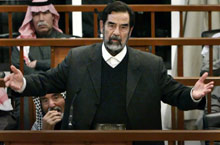
Former Iraqi President Saddam Hussein
speaks at his trial in Baghdad in this March 1, 2006 file photograph. The trial
of Saddam resumed on Monday without the ousted Iraqi leader, who was being fed
through a tube on Sunday after 16 days on hunger strike. (File
photo/Xinhua/Reuters)
The trial of former Iraqi President Saddam Hussein and seven of his
co-defendants for alleged Dujail massacre resumed on Monday, without presence of
Saddam, who is under medical treatment due to a 17-day hunger strike.
Chief judge Raouf Abdul Rahman began the session with hearing final arguments
of Barzan Ibrahim, Saddam's half brother and former intelligence chief.
Ibrahim rejected his court-appointed lawyer and asked to leave the court, but
Rahman refused his demand.
Ibrahim's appointed lawyer, whose voice was disguised, read out dozens of
pages to defend his client urging the court to throw out the case.
"There is not a single piece of evidence to involve my client in the Dujail
case," he told the court.
However, Ibrahim said, "I am not interested in the defense case, because this
lawyer does not represent me."
"This tribunal is illegitimate, because the United States occupied Iraq
without a resolution from the UN Security Council. My presence here is contrary
to the Geneva Convention," he said.
He also accusing the lawyer of blackmailing his family, saying the lawyer
asked for thousands of U.S. dollars to represent him.
Saddam and his lawyers announced earlier that they would boycott the trial,
demanding an adjournment to allow more time to prepare their final arguments.
They also demanded that authorities provide adequate protection to Iraqi
lawyers and their families following the killing of Khamis al-Obeidi, the third
defense lawyer killed since Saddam's trial began last October.
But Rahman rejected a petition submitted by chief of Saddam's defense team,
Khalil al-Dulaimi, saying the court would appoint lawyers if Saddam's defense
team refused to appear.
Saddam was hospitalized on Sunday due to hunger strike and was fed by a tube,
according to the court's chief prosecutor Jaafar al-Moussawi, who told reporters
that he might not be able to attend the court session scheduled for Monday.
Saddam's hunger strike came in protest against the Iraqi High Tribunal's
procedures and lack of security for defense lawyers.
Saddam and his seven co-defendants were charged with crimes against humanity
for the killing of 148 Shiites in Dujail after he survived an assassination
attempt in 1982.



